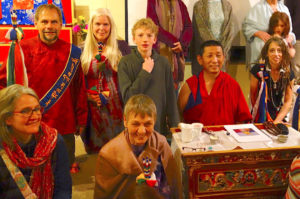By Martha Quillen
If you look at the big picture, the United States is doing very well. Per capita income is up, and murder rates, war deaths, and unemployment are down. But Americans are increasingly unhappy. The World Happiness Report (an independent project published annually by the U.N.) indicates the U.S. dropped from 14th place in 2017 to 18th in 2018.
The Washington Post describes six variables that are considered: income, health, having someone to count on in times of trouble, generosity, freedom, and trust. Our country scored low on four of those. According to stats, our health isn’t good in comparison to other first world nations; our charitable giving is down; and the Americans polled indicated they didn’t have enough social support, and don’t trust our government or businesses.
Yet our score isn’t dismal; more than 150 nations were assessed and we are in the top twenty. The results are only alarming due to the factors considered. Happiness is hard to measure, so people can debate whether the experts get such comparisons right.
But some factors are more easily calculated. According to the National Institute of Health, “Suicide is a major public health problem, and a leading cause of death in the United States.” And one of the reasons cited for our poor happiness score is an unprecedented drop in life expectancy, which is partially ascribed to three national epidemics: obesity, opioids, and depression.
Viewpoints about why we’re unhappy vary. Jeffrey Sachs, an economist, renowned expert on sustainable development, and co-author of the World Happiness Report, thinks our culture is promoting an Ayn Rand sort of society based on selfishness and self-interest that is making us all miserable. Commentators with similar views write about our society’s emphasis on money, materialism, and being on top, and the increasing gap between our nation’s rich and poor. Others blame American diets; social disconnectedness and loneliness; and problems with alcoholism and drug addiction.
There is, however, good news for Colorado, which ranked sixth in the Happiest State survey for 2018, up from 15th in 2017. Some of the reasons for Colorado’s score are obvious. People here tend to be thinner than people in the rest of our country, and sunlight plays a positive role in happiness stats.
But despite Colorado’s good fortune, dissatisfaction plagues our entire culture, and influences our everyday lives, relationships, and political processes. Modern commentary, for instance, conveys a curious mix of open contempt and wounded feelings, whether it’s on FOX and MSNBC or here in Salida. The only difference is whether the ambivalence expressed concerns zoning conundrums and recreational offerings or nuclear weapons and international disasters.
In America’s heartlands, we fight hard about less, but we also look out for one another. In our region, locals are personally helping neighbors, manning soup kitchens, and working to provide more affordable housing. But we likewise clamor for amenities that drive up costs and make life difficult for hard-working service workers. Yet pricey attractions are essential to our economy, so what’s a community to do?
[InContentAdTwo] At this point we seem most intent on blaming people for our problems. But figuring out who and what went wrong won’t necessarily make things better. For that we have a whole bevy of societal self-improvement books, podcasts, journalists, and think tanks. One of the latest books is The Opposite of Hate: A Field Guide to Repairing Our Humanity by Sally Kohn, a self-described “lefty lesbian,” who used to mix it up on FOX, and now works for CNN. One of my favorite books is Fair Shot: Rethinking Our Inequality and How We Earn by Chris Hughes, because it addresses changing our economic policies rather than fixing citizens (which isn’t really a political prerogative).
And Condoleezza Rice also has something to say about mending our differences. In an interview for her book, Political Risk, she mentioned the populist movement that facilitated the BREXIT and Trump wins, and said a friend referred to our 2016 election as the “Do you hear me now?” vote. Rice’s conclusion is we need to listen.
In a welcome relief from the norm, Michael Gerson, an evangelical, critiques his own brethren rather than the opposition. Gerson, a Washington Post columnist and former speechwriter for the G.W. Bush administration, now works for a Christian think tank. In “How Evangelicals Lost Their Way,” (The Atlantic, April 2018), Gerson complains about how blithely evangelicals dismiss Trump’s blatant sexism, profanity, cruelty, and unChristian conduct.
Instead Gerson champions the old-fashioned evangelical stances that favored abolition and social justice for African Americans and women. According to Gerson, politics have had a bad effect on religion. “Rather than choosing their own agendas, evangelicals have been pulled into a series of social and political debates started by others. Why the asinine issue of spiritually barren prayer in public schools? Because of Justice Hugo Black’s 1962 opinion.”
Gerson regards evolution as a fact that isn’t inconsistent with faith. But he also defends the evangelical uproar over A Civic Biology, the text that incited the Scopes trial, because it defended eugenics and called for sterilization of epileptics and the feeble-minded. In other words, as Gerson sees it, evangelicals used to fight issues worthy of debate, but are now “one interest group among many, scrambling for benefits at the expense of others rather than seeking the welfare of the whole.”
And why is that? Gerson says it’s because, “Trump consistently depicts evangelicals as they depict themselves: a mistreated minority, in need of a defender ….”
Gerson doesn’t regard white Christians as victims. But Christians aren’t alone in seeing themselves as attacked and disrespected. College students, women, white nationalists, Southerners, Democrats, and displaced industrial workers increasingly complain about being unheeded and mistreated. And they’re right. People have a natural propensity for turning a blind eye on the difficulties faced by their political rivals – and partisan animosity has made our tendency toward reflexive dismissal worse.
Some blame Identity Politics and the failures of Affirmative Action for our current dissension. But those old movements didn’t fail. They brought us here, to a time when you can ride on any bus and eat at public restaurants regardless of your race and ethnicity.
But now new prejudices are evolving, based on class, education, and employment. And despite constitutional amendments that protect freedom of religion and thought, there are concerted efforts on the part of both Republicans and Democrats to inhibit free choice regarding sexual, medical, and personal decisions. And there are too many cynical attempts to suppress votes. And too many citizens assume governments have the right to decide what sort of people are most worthy, how transgendered children will be treated, who will have sex with whom, and other personal matters.
When an interviewer asked Patrisse Khan-Cullors, a co-founder of Black Lives Matter, what the phrase All Lives Matter means to her, she said it was a cop-out, a way to avoid confronting racism. And she’s right. That’s how the phrase is used today.
Yet championing fair and equal treatment for all Americans is a cause we need to embrace. Groups like Black Lives Matter, AARP and the VFW inform and advocate for their members to remind us of important issues. But in terms of governmental rights and protections, black lives are no different than white lives, are no different than police officer’s lives, are no different than Islamic lives. They are all equally fragile and irretrievable, and citizens and their elected representatives should be deeply concerned about what’s happening to black Americans, immigrants, women, displaced workers and police, children and protesters caught in the crossfire.
The inherent promise of being an American is life, liberty, and the pursuit of happiness for all – not just for those with power, money, and a majority vote.
Martha Quillen peruses stats in Salida. For hundreds of pages on happiness, see worldhappiness.report/.




